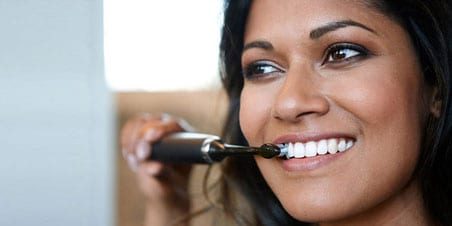
Periodontal disease treatment, causes & prevention

When you’re in the middle of brushing your teeth, you’ve likely never stopped to consider the possible link between oral health and the environment. However, approximately 27 tonnes of plastic waste are due to dental waste in the UK alone.1 Therefore, it is important to do our part to practice a more eco way of dental care and sustainable oral care as even small changes can make a big difference to our planet in the long term.
In this guide, we’ll explore how to be more environmentally friendly at home, especially in the bathroom. One way to do this is to switch to sustainable oral health alternatives, such as refillable toothpaste, sustainable electric toothbrush heads, or reduced water usage – all without compromising on quality oral hygiene.
Unfortunately, many of the oral health products we use daily have been designed for practicality and convenience, without considering their environmental implications. When comparing oral health and the environment, some of the biggest concerns include: If you are concerned about dental waste and want to learn how to be sustainable at home and in the bathroom, there are plenty of eco-friendly oral care solutions you can try. We’ll explore these in the next section.
Looking to build a more sustainable beauty routine for your oral health? Let’s break down the environmental impact of manual vs electric toothbrushes:
One of the most common types of dental waste is the disposal of plastic toothbrushes. Traditional toothbrushes are often made from non-recyclable and non-biodegradable thermoplastic materials that have been found to contribute to polluting our oceans and landfill sites.4
Fortunately, we are starting to see more sustainable oral care alternatives on the market, such as manual toothbrushes made from bamboo plants – bamboo is not only biodegradable but is also a much more environmentally sustainable option.5 Other plastic alternatives include:
• Charcoal-infused bristles which are typically made from bamboo or wood handles
• Wood handles that are sourced from wood such as beech wood
• Cornstarch-based plastic is a plant-based alternative that decomposes faster than normal plastic
• Recycled plastic from repurposed plastic
Do you prefer electric toothbrushes? While electric-powered toothbrushes may have a larger environmental impact than bamboo toothbrushes, they can still be a more sustainable oral care choice for reducing waste if you choose the most eco-friendly options.5
For instance, opting for a sustainable electric toothbrush that uses replaceable heads, such as the Philips Sonicare DiamondClean Prestige can help you achieve optimal oral health while still looking after the planet. With the DiamondClean Prestige, you can easily look after your toothbrush by simply replacing the bristles once they start to wear and recycling your sustainable toothbrush heads.
Another option is to choose sustainable toothbrush heads like the Philips Sonicare brush heads. Not only are Philips brush heads always replaceable, the Sonicare high-quality brush heads now come in paper-based packaging, allowing you to maintain an exceptionally fresh and clean mouth while also reducing plastic waste.
Choosing the right toothbrush and toothbrush heads is essential, but there are other small changes you can make to create a more sustainable oral care routine. Good oral hygiene does not need to be sacrificed to build a more sustainable dental care routine. Instead, it is about making a holistic choice that benefits both you and the planet.
Series 7100
Rechargeable toothbrush
HX7429/02